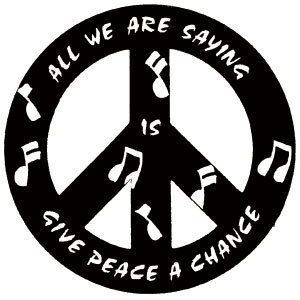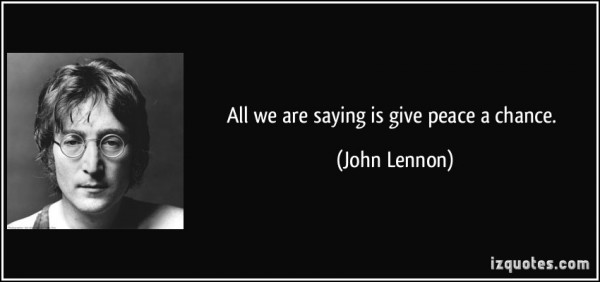I’ve always wanted to go to a peace conference and was drawn to this one through the name “World without war: Action for Peace.” We seem to be losing the battle for a peaceful world, and any action would be a useful place to start.
Not everyone shared my enthusiasm about attending. My daughter yawned. “What are people going to sit around all day saying I want to be peaceful? They’ll probably get really stressed and start arguing.” My best friend told me it was very worthy and rolled her eyes.
When I applied to my local board professional development fund for the fee, I was told there was no business case for attendance at a peace conference. My protests on the importance of peace in governance and conflict management fell on deaf ears and I felt far from peaceful and quite misunderstood as I paid the online fee. Ironically the first thing I saw on arrival was a big banner proclaiming that Auckland is a City of Peace so felt smugly vindicated.
So what were the big takeaways for me that justified two days indoors listening to people droning on?
Firstly, the many ways in which technological developments are exciting and lead to better social outcomes, but also how we need to be wary of their appropriation for negative purposes – tagging bees with cameras gives us insight into their life cycle, but the flip side is the use of minute cameras for surveillance purposes, for example.
The use of autonomous weapons was particularly scary – drones and robots able to target people by facial recognition. While we hold up terrorism as a possible use for this technology, one person’s terrorist is another’s freedom fighter and the technology allows governments to operate against their own people. We see this repeated time and again in governments humiliating and abusing their detractors, minority and ethnic populations.
The Australasian premiere of The Man Who Saved the World, about the closest known time that the world has come to nuclear war, highlighted the current threat we face of having over 1,000 nuclear missiles ready to launch at any one time. As Phil Goff pointed out in the introduction to the film – a dozen would result in complete destruction of the world, so why is so much of the world’s wealth pushed into maintaining and updating a nuclear arsenal? As for deterrance. A launched missile takes 15 minutes to reach its destination. The deterrance effect is meaningless once a missile has been fired.
What came through in the film was the incredible humanity of Stanislav Petrov. In his decision not to press the button and send Russian missiles in retaliation to a suspected US first strike, he thought beyond his circumscribed role as a soldier – thereby choosing the possibility that his country might be annihilated over the need to retaliate against a perceived threat.
As we think of drones and robots assuming more and more status in warfare it is imperative that we realise that unlike Stanislav Petrov, “Machines cannot fathom the importance of life, and the significance of the threshold that is crossed when a life is taken” (Christof Heynes UN Special Rapporteur on Convention on Conventional Weapons held in April 2015) – [quotation provided by Edwina Hughes of the Peace Foundation].
Celia Wade-Brown talked of Wellington Council’s endorsement of the Mayors for Peace initiative and the presentation of a statement calling for the abolition of nuclear weapons at the the UN on 26 September. Anyone can sign the petition and communities could bring pressure local councils and government to support work in this area and join the Mayors for Peace initiative. Clearly, while there are other issues to distract us, the presense of live nuclear warheads is one of the biggest threats to our civilisation.
Soul of Fire, written by Susanne F. Wolf, provided an inspiring look at the work and life of Austrian pacifist and first female Nobel Peace Prize Laureate Baroness Bertha von Suttner. The script, a collage of things she said and wrote, provided insight into a complex character. The characterisation and singing by Austrian actress Maxi Blaha and accompaniment by Georg Buxhofer were superlative while really bringing Bertha to life for a contemporary audience. There are still a couple of opportunities to see this in Dunedin and Christchurch.
It was exciting to hear about the educational work in peace and conflict resolution, mediation and leadership being led by the Peace Foundation. When we combine this with the desirability of good team players in the workplace, and the importance of effective communication in society, it would be great to see this work supported through funding by the Ministry of Education.
The message from the few young people who were present is that they would like to be listened to. For a local board representative, listening is an undervalued skill, drowned out in the morass of voices telling people what to do and how to think. Personally I think it’s not just young people that need to be heard but that sea of “others” who get talked at, have decisions made for them, and yet are seldom invited to have a seat at the table.
There is still work to be done I feel in connecting the awareness of injustice (of which we are all so quick to point the finger) with the practice of peace. We praise our children for coming up with peaceful solutions, support them in peaceful conflict resolution, and yet in our workplaces, higher education establishments and government we display behaviours and interactions that are far from peaceful – often intended to provoke or demonstrate how personally offended we are. While we talk of being the change we want to see, I’d like to see people value and model peaceful behaviour and recognise that – like the fluttering butterfly wings -everything we do has an effect.
I wonder if the Peace foundation could find a role in extending some of their programmes? I’d certainly be grateful for a bit of peace training at local government level. And perhaps we should encourage mandatory attendance at peace events for elected representatives.
I’d like to thank the Peace Foundation, speakers for a very thought-provoking weekend.
Shirin Brown is a teacher, film-maker and playwright and currently lectures in digital media and film theory at AUT. She was elected to the Waiheke Local Board in 2013 and has always felt it is important to speak out against injustice and for the rights of women and minorities. Her early memories include standing outside the South African embassy in London, protesting against the poll tax and demanding that the US stop their covert actions in Nicaragua.







If Nuclear weapons did not provide a deterrence why was there no major direct conflict between the US and Soviet Union between 1945 and 1990?
Because;
(a) were very, very lucky,
(b) saner heads prevailed,
(c) many in the Soviet and Western military had gone through WW2 and did not want a repeat of that destruction – especially Soviet generals who had witnessed the annihilation of much of their country at the hands of the fascists.
No doubt you have your own version of history.
Atomic weapons and the threat of MAD probably did contribute to the deterrence, Gosman, but if you fully understood the horror of how close this planet got to total destruction on many occassions, I doubt you’d be a cheerleader for these vile things.
I can’t help but wonder how many civilisations throughout the Universe weren’t quite as fortunate.
Thank you for acknowledging that the threat of global nuclear destruction did play a part in deterring both the US and the Soviet Union from directly attacking the other side. That is at odds with what the writer of the article stated I would like to point out.
We’re no longer in a cold war situation so do we need live nuclear warheads. There are a number of countries with active nuclear arsenals.
Aside from computer malfunction, the biggest risk is from hacking. You no longer need to physically steal a warhead, you could just hack a system and launch one causing chaos or redirect it to other perceived enemies. The current potential threat outweighs the perceived deterrance benefit, even if you think they may have fulfilled this function in the past.
One fact is true for the human race: We never managed to un-invent a weapon. Nuclear weapons are here to stay – regardless of what we may wish.
As for your quote of Phil Goff: “As Phil Goff pointed out in the introduction to the film – a dozen would result in complete destruction of the world” That is plain silly. He needs to check his facts.
Comments are closed.